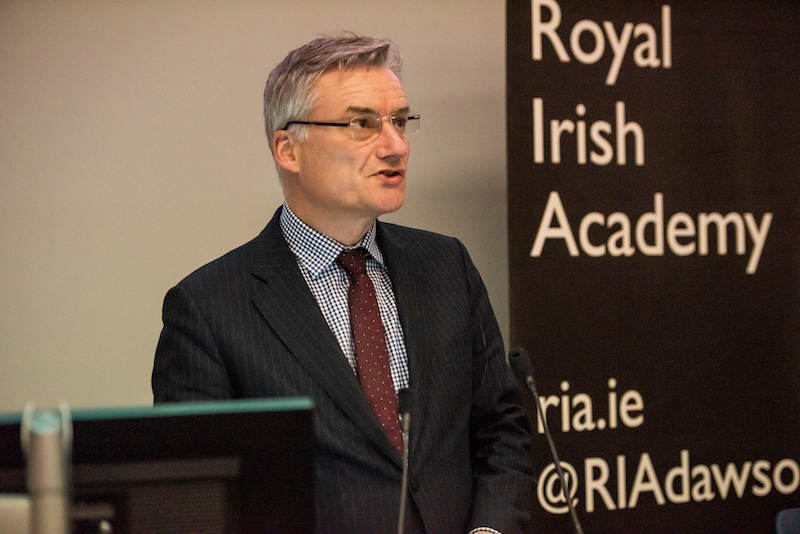Provost Patrick Prendergast and Chair of the Board Review Working Group Dermot McCarthy fielded tricky questions on the merits behind proposed College Board reforms at an online town hall this morning.
While the Provost and McCarthy remained on sure footing for much of the meeting – which was chaired by Tom Molloy, Trinity’s director of public affairs and communications – they stumbled over questions surrounding how an increase in external members on the College Board along with a reduction in its overall size would improve on the current set up.
A former top civil servant, McCarthy painted a picture of a Board remaining as a “critical piece of governance infrastructure” that sits within a system of governance, and appeared well-versed on this element of the proposed changes.
Principal committees, he said, could take over the running of much of the managerial side of governance, leaving Board with more time to discuss the strategy of Trinity moving forward and to oversee the doings of principal committees.
“The way the principal committees work, the way their agendas are set, the support that they’re given and the way they engage with Board in both directions – with Board setting priorities and headlines and committees raising issues and reporting on their work – will need to be revisited”, he said.
Board would have a more “holistic” view of College, McCarthy said, and rejected the idea of having a Fellow from each faculty on College Board, saying: “We see the Board as having a comprehensive responsibility for the welfare and advancement of the college community as a whole and in some respects the idea of sectional representation runs counter to that.”
Over the question of why the new College Board would improve on the current arrangement, the Provost seemed reluctant to come down too harshly on the present Board.
“I think over the decades, Trinity has done reasonably well, so I’m not by any means suggesting, and I don’t think the consultation paper is or others on the working group are, that the system is in need of immediate reform and is about to collapse”, he said.
When getting into specifics, however, he cited underfunding as a primary reason for the need to reform the Board.
“I think that perhaps if there were more people external to universities that were informed about how universities work – they would be our external members – they could help us influence better the political system”, he said. “Not just the political system but the civil servants that operate within it as well.”
As the town hall was conducted over Zoom, attendees could not interrupt proceedings and could only send in questions to the chair of the meeting. However, Eunan O’Halpin, a former member of College Board, commented on Zoom’s chat function in response to the Provost’s reasoning, saying that equivalent boards in University College Dublin, University College Cork and NUI Galway were “awash with external representatives intimately connected with the political system”.
“The idea that more external members equals greater influence on national policy just does not hold water”, he added. “All it promotes is ‘me too’ parochialism, whereby each institution wants to do everything their neighbour does.”
McCarthy pointed to improved “agility” as an advantage of the proposed governance structure, saying: “It does seem that we can certainly assert that the time and energy of Board has been disproportionately applied to operational questions rather than some of the bigger issues which are facing College and indeed the wider higher education sector.”
He did not, however, elaborate on why a smaller Board with less internal members would lead to a greater focus on broader issues and why a reduction in size was necessary for this refocus.
The Board Review’s consultation paper, which was published online in June, proposes significant changes to the size and structure of the Board, as well as a shifting of its focus to larger issues faced by college as a whole. This newspaper reported last month that the consultation paper proposes halving the number of Board members from its current 27 members to between 11 and 15.
The working group also proposes an increase in independent external members to as much as 40 per cent and the introduction of an external Chair – a position that is currently held by Prendergast, in addition to his role as Provost.
The Provost also appeared unsure about the merits behind separating the roles of Provost and Chair of Board, saying that it was “not a slam-dunk that it’s the best thing to do to separate them”.
He said that Trinity had “done reasonably well many would say by having the Provost effectively like a chief executive officer and the chair of the Board being the same person”, adding that “the chair and the Provost would have to have a good working relationship” if the roles were to be separated.
The proposal to separate the two roles follows previous controversy over how Prendergast ran Board meetings. In 2015, The University Times reported that previous board members considered the Provost’s approach to Board to be heavy-handed and that they felt disrespected.
One member, speaking on the condition of anonymity said: “I had the impression that Board members are neither valued nor respected. Everybody who is on Board is there to serve the university, but often the impression from the Provost can be that we are just bothering him in the implementation of his plans. That’s something that I was pretty shocked about.”







